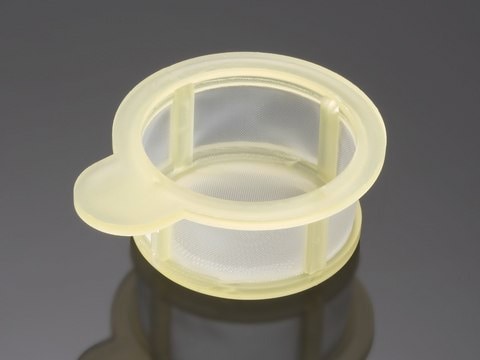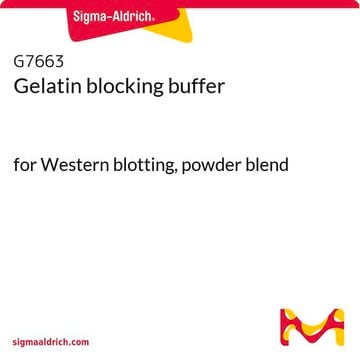2170
ChemiBLOCKER
Sinonimo/i:
Blocking Reagent
Autenticatiper visualizzare i prezzi riservati alla tua organizzazione & contrattuali
About This Item
Codice UNSPSC:
41116010
eCl@ss:
42029053
Prodotti consigliati
Confezionamento
pkg of 1 L
Produttore/marchio commerciale
ChemiBlock
Chemicon®
tecniche
ELISA: suitable
immunohistochemistry: suitable
western blot: suitable
Condizioni di spedizione
wet ice
Descrizione generale
The ChemiBLOCKER is an unique membrane-blocking agent. As a non-animal protein blocker it offers an alternative to milk-based blocking agents, minimizing the risk of non-specific binding of antibodies to your membrane and lowering your background. ChemiBLOCKER may be used at dilutions as high as 20x but for most applications, a 5 to 10 fold dilution is appropriate. ChemiBLOCKER is biotin free and will not interfere with ABC detection systems. ChemiBLOCKER does contain phosphates and may not be suitable for use with some phospho-specific antibodies.
Related Products:
• BLOT-QuickBlocker A novel blocking protein which produces a semi-clear solution. This allows users the option to examine their blot membranes during the blocking procedure. 200g Catalog Number 2080
• Femto/TBST wash buffer (10X) 250mL Catalog Number 2081
Materials required:
• 1X femto/TBST (Catalog Number 2081), 1X TBST, or 1X PBST
• primary and secondary antibodies
• reagents for immunodetection
Related Products:
• BLOT-QuickBlocker A novel blocking protein which produces a semi-clear solution. This allows users the option to examine their blot membranes during the blocking procedure. 200g Catalog Number 2080
• Femto/TBST wash buffer (10X) 250mL Catalog Number 2081
Materials required:
• 1X femto/TBST (Catalog Number 2081), 1X TBST, or 1X PBST
• primary and secondary antibodies
• reagents for immunodetection
Applicazioni
Western Blot
ELISA
PROTOCOL:
1. Make up blocking solution by mixing 1 part ChemiBLOCKER with 1 part 1X femto-TBST/PBST (TBST or PBST also work) for blocking PVDF membranes. For nitrocellulose membranes, mix 1 part ChemiBLOCKER with 3 parts 1X femto-TBST (TBST or PBST also work). Note:ChemiBLOCKER can be used at a wide variety of dilutions, some optimization may be necessary. ChemiBLOCKER is NOT recommended for phospho-protein studies as it does contain phosphorylated proteins.
2. Incubate the membrane in blocking solution (10-20 mL) for 60 minutes at room temperature with shaking in a heat-sealable plastic bag.
3. Prepare antibody dilution buffer (ADB). For PVDF membranes mix 1 part ChemiBLOCKER with 3 parts 1X femto-TBST/PBST (TBST or PBST also work). Incubate the membrane in 5-10 mL primary antibody, diluted appropriately with ADB, for 90 min at room temperature with shaking.
4. Wash the membrane 3 times in 50 mL of 1X femto-TBST (TBST or PBST also work) for 5 min each time at room temperature with shaking.
5. Incubate the membrane in 5-10 mL secondary antibody, diluted appropriately with ADB, for 90 min at room temperature with shaking.
6. Wash the membrane as in step #4, but add one extra wash (4 washes total).
7. Wash the membrane 3 times quickly (30 sec.) in 50 mL pure deionized water each time and then process the blot, using femto-LUCENT detection system (or your favorite system).
ELISA
PROTOCOL:
1. Make up blocking solution by mixing 1 part ChemiBLOCKER with 1 part 1X femto-TBST/PBST (TBST or PBST also work) for blocking PVDF membranes. For nitrocellulose membranes, mix 1 part ChemiBLOCKER with 3 parts 1X femto-TBST (TBST or PBST also work). Note:ChemiBLOCKER can be used at a wide variety of dilutions, some optimization may be necessary. ChemiBLOCKER is NOT recommended for phospho-protein studies as it does contain phosphorylated proteins.
2. Incubate the membrane in blocking solution (10-20 mL) for 60 minutes at room temperature with shaking in a heat-sealable plastic bag.
3. Prepare antibody dilution buffer (ADB). For PVDF membranes mix 1 part ChemiBLOCKER with 3 parts 1X femto-TBST/PBST (TBST or PBST also work). Incubate the membrane in 5-10 mL primary antibody, diluted appropriately with ADB, for 90 min at room temperature with shaking.
4. Wash the membrane 3 times in 50 mL of 1X femto-TBST (TBST or PBST also work) for 5 min each time at room temperature with shaking.
5. Incubate the membrane in 5-10 mL secondary antibody, diluted appropriately with ADB, for 90 min at room temperature with shaking.
6. Wash the membrane as in step #4, but add one extra wash (4 washes total).
7. Wash the membrane 3 times quickly (30 sec.) in 50 mL pure deionized water each time and then process the blot, using femto-LUCENT detection system (or your favorite system).
Confezionamento
sufficient for 100 mini gel blots
Componenti
2X ChemiBLOCKER 1 L
Stato fisico
A 2X solution of non-animal proteins in 2mM TRIS, pH 8.5, 100mM NaCl, 0.001% Tween-20, and 0.08% Kathon added as a preservative.
Stoccaggio e stabilità
Store kit components at 2-8°C for up to 1 year from date of purchase. Warm ChemiBLOCKER to room temperature and mix thoroughly before dispensing. To avoid possible microbial contamination, dispense all solutions aseptically. Over time, phenolic compounds may precipitate out of solution resulting in the formation of a small amount of dark brown to black particulate material at the bottom of the container. This material will not affect the performance of the blocking compound.
Note legali
CHEMICON is a registered trademark of Merck KGaA, Darmstadt, Germany
Avvertenze
Warning
Indicazioni di pericolo
Consigli di prudenza
Classi di pericolo
Aquatic Chronic 2 - Eye Irrit. 2 - Skin Irrit. 2 - Skin Sens. 1
Codice della classe di stoccaggio
12 - Non Combustible Liquids
Classe di pericolosità dell'acqua (WGK)
WGK 3
Punto d’infiammabilità (°F)
Not applicable
Punto d’infiammabilità (°C)
Not applicable
Certificati d'analisi (COA)
Cerca il Certificati d'analisi (COA) digitando il numero di lotto/batch corrispondente. I numeri di lotto o di batch sono stampati sull'etichetta dei prodotti dopo la parola ‘Lotto’ o ‘Batch’.
Possiedi già questo prodotto?
I documenti relativi ai prodotti acquistati recentemente sono disponibili nell’Archivio dei documenti.
Tim Waterboer et al.
Clinical chemistry, 51(10), 1845-1853 (2005-08-16)
More than 100 different human papillomaviruses (HPVs) can cause proliferative diseases, many of which are malignant, such as cervical cancer. HPV serology is complex because infection and disease lead to distinct type-specific antibody responses. Using bead-based technology, we have developed
Widespread thalamic terminations of fibers arising in the superficial medullary dorsal horn of monkeys and their relation to calbindin immunoreactivity.
Graziano, Alessandro and Jones, Edward G
The Journal of Neuroscience, 24, 248-256 (2004)
Mercè Farràs et al.
mAbs, 12(1), 1702262-1702262 (2019-12-27)
Despite advances in medical care, cancer remains a major threat to human health. Antibody-drug conjugates (ADCs) are a promising targeted therapy to overcome adverse side effects to normal tissues. In this field, the current challenge is obtaining homogeneous preparations of
Mercè Farràs et al.
BMC molecular and cell biology, 21(1), 2-2 (2020-01-23)
Monoclonal antibodies (mAbs) and their derivatives have become one of the most important classes of therapeutic drugs. Their multiple applications increased the interest for understanding their complex structure. In vivo, animal cells are able to fold mAbs correctly (Song et
Il team dei nostri ricercatori vanta grande esperienza in tutte le aree della ricerca quali Life Science, scienza dei materiali, sintesi chimica, cromatografia, discipline analitiche, ecc..
Contatta l'Assistenza Tecnica.









